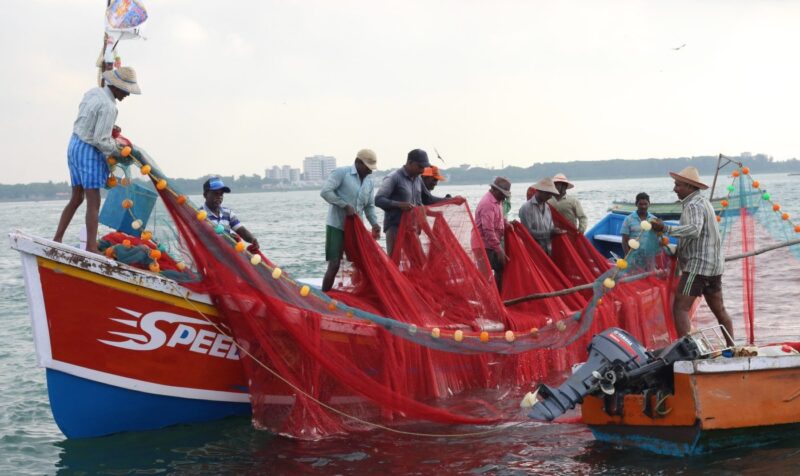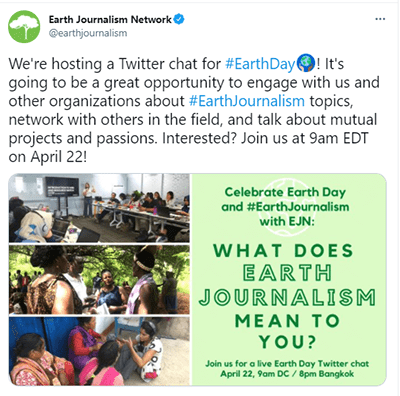EJN’s Bay of Bengal project actually gave me a realization that I have not done much environmental reporting, even though I come from one of the country’s most climate vulnerable regions – Chittagong. The difference that I see in myself and in my writing is that ever since I attended that workshop, I started writing on local issues, giving voice to local people and connecting those [to] the climate change discourse.”
– Shamsuddin Illius, journalist
With Earth Day almost upon us, we’ve been taking stock here at EJN. Since our beginnings in 2004, we’ve grown to more than 13,000 members across the globe who have produced more than 12,800 stories with our funding and mentorship. That’s a lot of journalism about the Earth! For this year’s Earth Day, we’re celebrating the many impacts EJN has had on environmental policies around the world. We’ve been documenting them for many years, and now have started collecting and posting these impact stories on a new page on our website.
In addition, just yesterday we hosted a webinar on how to cover zoonotic diseases that highlighted the launch of our new online course on the topic, which is freely available for journalists everywhere. We’ve also begun a new project focused on the global impact of fisheries subsidies, and we’ll soon be releasing a call for journalists to submit ideas for story grants about the topic. We’ll be holding a webinar on the topic on May 4, and several other webinars, as well, on everything from clean mobility in India to poaching’s money trail in East Africa. Meanwhile, our story grant opportunities in India and Latin America are open for a few more days. As always, read on for more, and Happy Earth Day!

Documenting EJN’s Impacts on Environmental Policies
Since the inception of the Earth Journalism Network in 2004, we’ve tried to keep track of our impacts, but have found it easier to collect quantitative indicators as opposed to qualitative ones. Over the last decade, however, we’ve made an ever more concerted effort to keep track of how governments, institutions, companies and individuals respond to the stories or projects we support. We’ve been asking some key questions: What impacts have EJN’s activities had? Have the stories produced as a result of our funding or mentorship led to more informed conversations, action by individuals or communities, new policies or policy changes by governments, or other key outcomes? Read more
EJN Launches New Online Course for Journalists on Covering Zoonotic Diseases
More than a year since the very beginnings of Covid-19 journalism began to dominate the news cycle, zoonotic diseases continue to be a source of debate, conflict and misinformation worldwide. In response to the need for more information and journalism about this topic, EJN has launched a new online course for journalists looking to better understand the science behind zoonotic diseases, find available data on the subject and build skills in reporting on such an evolving topic. Read more
EJN Launches Phase 2 of Project Reporting on Fisheries Subsidies
Since 2019, EJN has been running a project in India focused on increasing the coverage of fisheries subsidies issues. We’re now launching phase 2, which will expand the project’s focus globally and to other regions where subsidies have a major impact on fishing. Read more
Media Grantee Hosts Philippines Climate Leader for Lecture on Role of Media
Rachel Anne S. Herrera, the commissioner of the Philippines’ Climate Change Commission, recently spoke to a group of climate change journalism fellows at Ateneo de Manila University’s Asian Center for Journalism (ACFJ), an EJN media grantee under our Asia-Pacific project. Read more
EJN Changes the Climate for Coverage by Local Media
EJN has been supporting journalists and media outlets — particularly those in low- and medium-income countries — to improve their coverage of climate change since our founding in 2004, and we’re primed to do so much more in the coming years. With increased funding, we can greatly expand our support of local media that elevate the voices of those who live with the negative economic, social and health impacts of climate change. Read more
Receiving a mentor from EJN for the first time in my life has provided me a wonderful opportunity to understand that writing a good and compelling story requires thinking out of the box. From [my] EJN mentor, I learned how to focus on the issues and present the story interestingly, use multimedia, different character-based photography and more.”
– Banani Mallick, Bangladeshi journalist
Webinars
- Learning About Zoonotic Diseases and How To Cover Them
The spillover of dangerous pathogens from animals to humans has become a hot topic over the last year due to the COVID-19 pandemic. How can journalists do a better job of covering this issue? Check out the recording of our special pre-Earth Day webinar on the topic.
- Earth Day Media Roundtable
If you’re looking to tune in on Earth Day itself, EJN’s Imelda Abano will be moderating a special Earth Day panel organized by the U.S. Embassy in the Philippines. The discussion will focus on how US climate change and environmental policy impacts and benefits the Philippines. Abano will be joined by Heather Fabrikant, the Press Attaché of the U.S. Embassy in the Philippines.
Date: April 22 | Time: 9:30-11am Manila
Learn More and Register
- Following Poaching’s Money Trail in East Africa
Organized crime and money laundering are major drivers of illegal wildlife trade in East Africa. Hear from experts in enforcement, law, journalism and more on this important topic.
Date: April 23 | Time: 4-6pm East Africa
Learn More and Register
- Clean Mobility in India
Join journalists and industry experts for a conversation about clean mobility issues in India and share your own story ideas.
Date: April 29 | Time: 11am India
Learn More and Register
- Can New Global Treaty Talks Help Prevent Overfishing?
Join us for a panel discussion on the impact of marine subsidies on overfishing and the ongoing treaty talks seeking to reform government policies in the fishing industry.
Date: May 4 | Time: 9am DC / 2pm London / 8pm Bangkok
Learn More and Register
- The Impact of Fisheries Subsidies in India
This webinar will focus on fisheries subsidies in India, providing local context and information about the role subsidies play in the country’s fisheries industry.
Date: May 13 | Time: 10am India
Learn More and Register
Opportunities
Internews Let’s Talk Vaccines Online Course Opens End of April
The COVID-19 vaccine is one of the biggest stories of 2021. As always, people turn to media as a source of trusted information to help them make sense of a rapidly changing world. During the COVID-19 pandemic, the onslaught of mis-and dis-information has created confusion and fueled vaccine hesitancy. Now, more than ever, journalists must have a basic grasp about the viruses that cause diseases on a large scale and the reasons why pandemics happen. The #letstalkvaccines online course builds reporting competencies around knowledge, skills and outlook. The course has 5 modules which explore vaccine science and development, access to vaccines, the logistics of rollout, vaccine confidence and the sources and resources to consult. Enrollment will open soon, so check back on the Internews website for more details.
We’ve also extended the deadline for two of our story grant opportunities:
- Investigating Environmental Policy in Latin America: Grants will support the production of enterprise stories that will explore how international diplomacy is shaping environmental policy in Latin America. Deadline extended: April 27. Learn more and apply
- Renewable Energy in India: Grants will support the production of in-depth stories on the policy, financing, payment and infrastructure hurdles around renewable energy in India broadly. Deadline extended: April 30. Learn more and apply
And we’ll have a new story grant opportunity for our fisheries subsidies project launching in May:
- Global fisheries subsidies story grants: We’ll be opening a new story grant opportunity for journalists about the role and impact of fisheries subsidies globally. Journalists around the world will be eligible to apply. Application link to come.
What we’re reading, watching, listening to:
- Reading: This article by renowned fisheries expert Daniel Pauly discussing the recent Netflix film, “Seaspiracy,” which focuses on the commercial fishing industry’s harmful, unsustainable practices. Pauly writes that he agrees with the core concept – that our world’s oceans are being relentlessly overfished – but challenges the film for numerous scientific inaccuracies, anti-Asian tropes and bias, and a failure to explore solutions beyond not eating fish.
- Watching: This recent talk hosted by The Wilson Center, which brought environmental officials from across Latin America to the table to discuss environmental leadership and international cooperation on climate change. Panelists included environment ministers from Chile, Argentina and Colombia, officials from the U.S. Department of State, the UN Special Envoy for the Ocean and other high-profile speakers.
- Listening to: This podcast episode from Climate Tracker Weekly, a podcast about young climate journalists around the world. In this one, host Chris Wright talks with Julie Bourdin, a French and South African multimedia journalist who focuses on migration and human rights. Their conversation is grounded in an issue many journalists face: The challenge between telling stories as a journalist and working as an activist. Give it a listen to hear a thought-provoking discussion about Bourdin’s journey and the way she walks that fine line.

